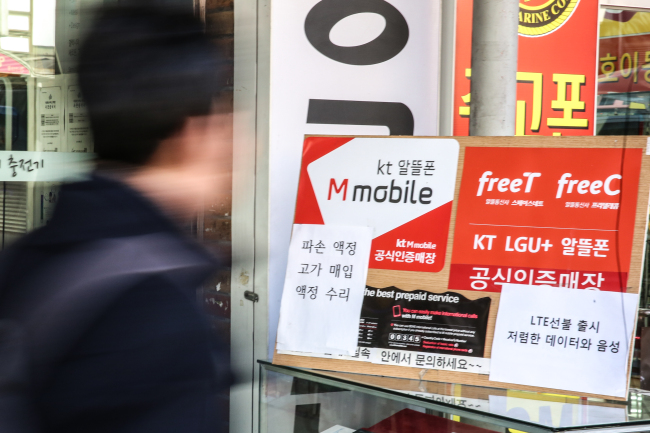After another failed attempt last week, doubts are growing over the Korean government’s search for a fourth telecom carrier in Korea.
Aiming to spur competition and lower service fees, the government has sought to pick a fourth player in the telecom market that has long been dominated by three big companies -- SK Telecom, KT and LG Uplus -- since 2010.
 |
A promotional sign for budget phones is seen at a retail shop in Seoul. Yonhap |
But the latest seventh attempt ended in vain again Friday as the three bidders -- Sejong Telecom, K Mobile and Quantum Mobile -- failed to come up with concrete funding plans for the huge facility investment required.
Industry watchers say that at least 2 trillion won ($1.65 billion) is needed to build the nationwide network infrastructure alone, and total initial costs could surge to 5 trillion won considering spending on marketing activities.
“CJ HelloVision was one of the most likely candidates for the pricey business. But with its planned merger with SK Telecom, there seems no eligible candidate in the market,” said an industry source.
“The government is unlikely to open a new round of bidding for some time.”
The Ministry of Science, ICT and Future Planning, which had already eased related regulations to attract new bidders, also didn’t specify its next bidding schedule Friday.
“We would continue efforts to relieve people’s financial burdens on soaring telecom costs by offering more incentives for budget phone users,” said Cho Kyu-jo, telecom policy chief at the ministry.
Following a possible policy shift, the nation’s budget phone market is expected to grow.
With slowing high-priced smartphone sales and people’s renewed awareness of cheaper phones, local manufacturers like Samsung and LG are increasingly expanding their budget phone lineups.
Their foreign rivals, especially those from China, are also fast penetrating into the market that was once deemed a “tomb” for foreign handset-makers, aside from Apple.
The changing trend is also a boon, not bane, for the top three telecom carriers, which have resisted to the government’s search for a fourth telecom company.
They have already received fees from mobile virtual network operators that offer cheaper mobile services by borrowing networks from the big three companies.
Korea Post, for instance, attracted more than 100,000 new subscribers in January, almost a third of its total 300,000 subscribers since it started a budget phone business in 2013 in partnership with Annex Telecom, which uses the KT and SKT networks.
“A fourth telecom carrier would pose a direct threat for MVNOs because price competition is unavoidable between them. But with the failed attempt, their budget phone business will grow further,” said an industry official.
By Lee Ji-yoon (
jylee@heraldcorp.com)








